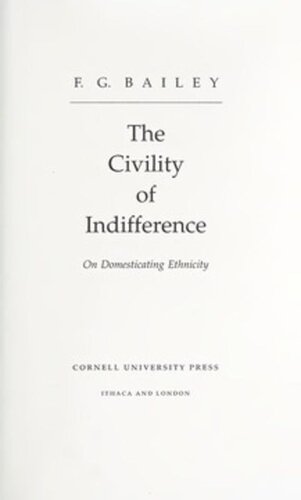

Most ebook files are in PDF format, so you can easily read them using various software such as Foxit Reader or directly on the Google Chrome browser.
Some ebook files are released by publishers in other formats such as .awz, .mobi, .epub, .fb2, etc. You may need to install specific software to read these formats on mobile/PC, such as Calibre.
Please read the tutorial at this link: https://ebookbell.com/faq
We offer FREE conversion to the popular formats you request; however, this may take some time. Therefore, right after payment, please email us, and we will try to provide the service as quickly as possible.
For some exceptional file formats or broken links (if any), please refrain from opening any disputes. Instead, email us first, and we will try to assist within a maximum of 6 hours.
EbookBell Team

4.1
70 reviewsThe dissolution of Yugoslavia inspired F. G. Bailey to consider the relations among ethnic groups that had seemed reconciled to living together and then broke into murderous conflicts. For his exploration of the ancient, recurring problem of ethnic strife, Bailey considers the village of Bisipara in the state of Orissa, in eastern India. Bisipara was a community in which different ethnic groups were seen as distinct breeds of people, arranged in a hierarchy of worthiness. In The Civility of Indifference, Bailey documents a case of ethnic strife that threatened the village forty years ago but did not consume it in bloodshed. The restraint, he suggests, reflected not compassion but a sense of inevitability. The people of Bisipara perceived the world in such a way that violence enacted as ethnic cleansing would have seemed to them a disastrous indulgence and a sure path to self-destruction. Their story serves as a parable of pragmatic indifference, in contrast to the fanaticism that justifies civil war. A seasoned ethnographer, the author considers the social structure of the community, examining the multiple castes with sensitivity and respect. His detailed description reveals the competing moral visions held by various groups and his conclusions open a new perspective on ethnic violence.